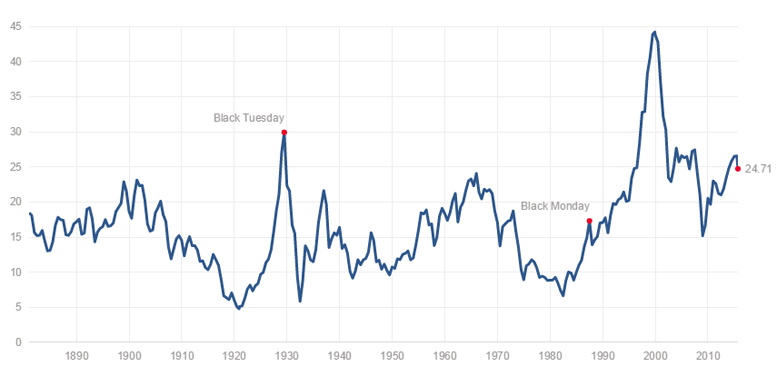Over the weekend, I noticed much talk from several financial media outlets on whether U.S. stocks are currently “overvalued.”
Stock market valuation is a tricky thing as there are many different ways to measure stock prices. However, there is one valuation technique that many investors agree with (including myself) known as the CAPE ratio. The CAPE ratio, which is also called the “Shiller PE Ratio” or “PE 10”, is short for the Cyclically Adjusted PE Ratio.
The CAPE ratio was developed by popular economist and Nobel economics laureate, Dr. Robert Shiller.
Put simply, CAPE is a price earnings ratio based on average inflation-adjusted earnings of the S&P 500 index from the previous 10 years.
To calculate:
1. Gather the annual earnings of the S&P 500 for each of the past ten years.
2. Use the CPI (Consumer Price Index) to adjust all of the earnings for inflation.
3. Divide the total earnings figure by ten to determine an average earnings figure for the last ten years (called e10).
4. Divide the current price of the S&P 500 by e10.
By measuring the last 10 years of earnings, the CAPE ratio provides a more accurate earnings view as it is far less prone to single-year volatility.
As you can see from today’s chart, the CAPE ratio is a handy way to determine if U.S. stock prices are “overvalued” relative to their earnings. Based on the last 120+ years of stock market data, the average CAPE ratio is around 16.62. When the ratio soars well above that level, stocks are considered to be overvalued. When the ratio falls well below this level, stocks are considered to be undervalued.
While it is not a perfect valuation tool, it is better than most, in my opinion.
And based upon today’s reading of 24.71, the CAPE ratio considers U.S. stocks to be overvalued. When this occurs, the probability of a bear market greatly increases. However, the CAPE ratio is a poor market timing tool. As the famous 20th century economist John Maynard Keynes once quipped, “The market can stay irrational longer than you can stay solvent.”
Just because stock prices are overvalued relative to their earnings doesn’t mean that a bear market is immediately around the corner. It simply means that stocks will eventually revert back to the mean. But when that will occur is anyone’s guess.
In a recent interview with the Financial Times, Dr. Shiller commented on the frothy state of the CAPE ratio:
“It looks to me a bit like a bubble again with essentially a tripling of stock prices since 2009 in just six years and at the same time people losing confidence in the valuation of the market…
I’m not looking for any big effect. It’s been talked about for so long, everyone knows that it’s coming. It’s just not much of a big deal.”Financial Times
Regarding the latest bout of volatility that has struck the financial markets, Shiller added:
“(It) shows that people are thinking something, worried thoughts. It suggests to me that many people are re-evaluating their exposure to the stock market. I’m not being very helpful about market timing but I can easily see aftershocks coming.”
Financial Times Indeed, the aftershocks are coming. But again, when they will begin is the million-dollar question.
For now, the charts suggest that U.S. stocks have more downside risk than upside potential. Of course, this week’s FOMC meeting will hopefully provide more clarity to the existing trend.
Until tomorrow,
Jerry Robinson








